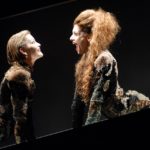Α’ performance: 19 November 2010, Attis Theatre, Athens
NEXT PERFORMANCES: 15 November 2024 – 2 March 2025
ALARME is a stage composition based on the correspondence between Queen Elizabeth I and Mary Queen of Scots. It sheds light on the paradoxical love-hate relationship between the two queens, who never actually met in person, in order to highlight the always relevant theme of power.
The two female historical figures face each other on the stage, as fossils but also timeless symbols that represent the corruption and intrigue of power, the aggression and the violence. Elizabeth dominates, Mary Stuart is submissive.
Queen Elizabeth (Sophia Hill) and Mary Stuart (Aglaia Pappa) exchange insults in English and French, mingled with contemporary political references, irony and cruel humor. The words death and blood are repeated as motifs that run through the entire human history.
At their opposite end we see the narrator (Tasos Dimas), a ragged pariah, a representative of the devastated and impoverished people. He is the spokesman of people’s despair, indignation and aversion to power, although he is inevitably dependent on his leaders.
The actors move on a stage beyond all theatrical conventions, like exhibits in a black museum. They expose their feelings to the audience in an era when, as Brecht said about the interwar period, “we will sell even our skin”.
Shows every:
Thursday, Friday, Saturday at 21.00
Sunday at 19.00
Running time: 60 minutes (no intermission)
Ticketsν: 15€, 10€ (student*)
Tickets available in
https://www.more.com/gr-el/tickets/theater/alarme/
Info: (+30) 210 5226260








